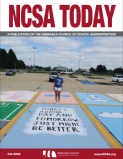Student Engagement
What do Abraham Maslow and Benjamin Bloom have to say?
By Dr. Dennison Bhola & Katie Diediker, HUMANeX Ventures
Have you ever wondered how the students in your district would respond if you were to ask them simple questions about their perceptions of safety, belonging and self-esteem?
Questions such as these were asked by the famous psychologist, Abraham Maslow, and are addressed in Maslow’s Hierarchy of Needs.

According to Maslow, before students’ brains are ready for learning, their survival, safety, belonging, and self-esteem needs must be met. That is, students’ brains are not prepared for the cognitive processes and energy expenditure that learning entails until their needs in the affective domain are satisfied.
This very observation was also made by Benjamin Bloom and his team after they created Bloom’s Taxonomy to explain different levels and depths of cognitive processing. This realization was the major impetus for immediately developing Krathwohl’s Taxonomy which focused on the Affective Domain. That is, after completing the Taxonomy of Educational Objectives which focused completely on the Cognitive Domain, Bloom and his colleagues admitted that students’ needs in the Affective Domain must addressed first because it is a prerequisite which sets the stage for learning to be possible.
HUMANeX Ventures has created a Student Engagement Survey to get answers from students on these important issues. Here are some sample results from a school district in the United States:

Other questions in the survey include:
- “I feel safe in school.”
- “I am comfortable asking questions in my classes.”
- “I look forward to being in school each day.”
- “My principal is doing a great job running our school.”
How do you think the students in your school district would respond to these statements? Do you believe that all of your students would agree with these statements?
What feedback are you providing right now to help your teachers know the impact that their efforts to create a school environment that is conducive to learning are having on their students?
In schools, many hours are dedicated to testing students in mathematics, science, social studies, reading, music and more. Would it be worthwhile to invest a fraction of this amount of time to understand how our students feel about the learning environment they experience every day? Both Maslow and Bloom would respond to this question with a resounding “yes.”
Today, social media gives students the power to share their opinions – positive or negative – easier than ever before. Whether they are cheering on their athletics team or celebrating a victory within the drama department, students want to share their perspective. The questions for leadership to address are:
- How can we leverage students’ feedback in a constructive, impactful way?
- Is our staff willing to listen to the students we serve, and use their input to improve their learning environment?
The clear and simple answer is that schools should invite students to answer questions that pertain to the issues addressed in Maslow’s Hierarchy with a specific focus on how they impact the learning environment. The feedback from students should be shared with teachers to help them understand students’ perspectives. Armed with this information, teachers can be empowered to brainstorm solutions, create action plans, and collaborate on initiatives to increase student engagement and learning.
The HUMANeX Ventures Student Engagement Survey uses Maslow’s Hierarchy as its foundation, and gathers such information from students in your district. Then, trained HUMANeX Ventures facilitators lead action planning sessions with the survey results to engage teachers in selecting areas to address, brainstorming, and collaborating on plans to increase student engagement and learning. HUMANeX Ventures also uses a train the trainer model to prepare personnel in your district to lead the brainstorming and action planning sessions.
For more information please contact Katie Diediker at katie.diediker@humanexventures.com
























